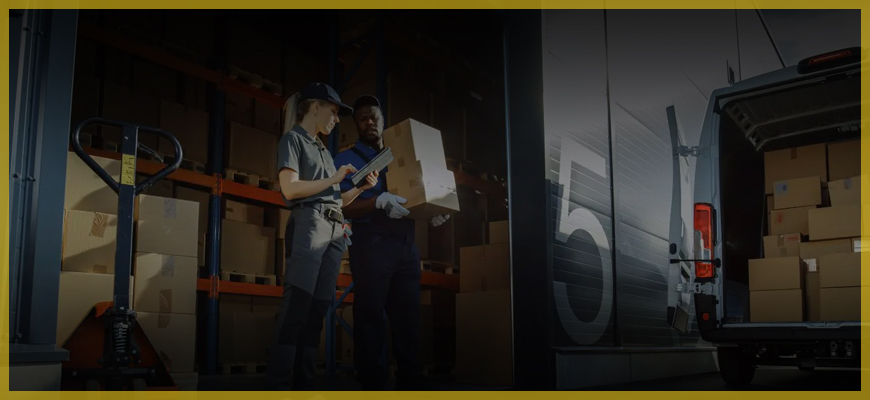

What is Last Mile Delivery? Challenges and Future Trends
- Apr 20, 2024
- By Afaq AlSareea
The last part of the delivery process is called last mile delivery. It is when goods are moved from a distribution center to their final destination, which is typically a home or a shop. This is an important step in the delivery process, as it often requires delivering packages in crowded or busy areas. The aim of last mile delivery is to deliver goods quickly and effectively to satisfy the growing customer demand for fast shipping, especially in online shopping, food, and retail sectors.
Last Mile Delivery Challenges
However, last mile delivery is also one of the most challenging and costly aspects of the logistics process. According to some estimates, last mile delivery accounts for 53% of the total delivery cost. Some of the common challenges faced by last mile delivery providers are:
High customer expectations
Customers expect fast, free, and flexible delivery options, such as same-day or next-day delivery, time-slot delivery, and real-time tracking. They also expect high-quality service, such as timely notifications, easy returns, and friendly delivery personnel. Failing to meet these expectations can result in customer dissatisfaction, negative reviews, and lost sales.
Traffic congestion
Delivering goods in urban or suburban areas can be hindered by traffic congestion, road closures, parking restrictions, and other factors that affect the speed and efficiency of delivery. Traffic congestion can also increase fuel consumption, emissions, and operational costs.
Route optimization
Planning and executing optimal routes for delivery vehicles can be a complex and dynamic task, especially when dealing with multiple orders, locations, time windows, and constraints. Route optimization requires sophisticated algorithms and real-time data to ensure the best use of resources and minimize travel time and distance.
Delivery failures
Delivery failures occur when the delivery personnel cannot complete the delivery due to reasons such as incorrect address, recipient not available, access denied, or damaged goods. Delivery failures can result in wasted time, fuel, and money, as well as customer dissatisfaction and complaints. Delivery failures can also increase the risk of theft, loss, or spoilage of goods.
Staffing and training
Finding, hiring, and retaining qualified and reliable delivery personnel can be a challenge for last mile delivery providers, especially during peak seasons or periods of high demand. Delivery personnel also need to be trained and equipped with the necessary skills, tools, and knowledge to perform their tasks efficiently and safely.
Solutions for Last Mile Delivery Challenges
To overcome these challenges, last mile delivery providers need to adopt innovative solutions and technologies that can enhance their operations and customer service. Some of the possible solutions are:
Delivery automation
Delivery automation refers to the use of autonomous or semi-autonomous vehicles, such as drones, robots, or self-driving cars, to deliver goods to customers. Delivery automation can reduce labor costs, human errors, and safety risks, as well as increase speed, accuracy, and convenience of delivery. Delivery automation can also enable delivery to remote or hard-to-reach areas, such as rural or mountainous regions.
Delivery lockers
Delivery lockers are secure and convenient storage units that allow customers to pick up their orders at their preferred time and location. Delivery lockers can reduce delivery failures, as well as provide customers with more flexibility and privacy. Delivery lockers can also reduce operational costs, as they can be located in strategic and accessible places, such as shopping malls, train stations, or office buildings.
Delivery crowdsourcing
Delivery crowdsourcing is a model that leverages the power of the crowd to perform delivery tasks. Delivery crowdsourcing involves outsourcing delivery to independent contractors or freelancers, who use their own vehicles and devices to deliver goods to customers. Delivery crowdsourcing can increase delivery capacity, scalability, and coverage, as well as reduce delivery time and cost. Delivery crowdsourcing can also provide customers with more personalized and localized service.
Delivery analytics
Delivery analytics is the use of data and analytics to optimize and improve delivery performance and customer experience. Delivery analytics can provide insights into various aspects of delivery, such as demand forecasting, route planning, delivery tracking, customer feedback, and delivery quality. Delivery analytics can help delivery providers make data-driven decisions, identify and solve problems, and enhance customer satisfaction and loyalty.
Last Mile Delivery Future Trends
The future of last mile delivery is expected to be shaped by these and other emerging trends, such as:
Sustainability
As environmental awareness and social responsibility increase, customers and regulators will demand more sustainable and eco-friendly delivery practices. This will require delivery providers to adopt green delivery solutions, such as electric or hybrid vehicles, renewable energy sources, and biodegradable packaging. Sustainability will also involve reducing carbon footprint, emissions, and waste, as well as increasing recycling and reuse of materials.
Personalization
As customer preferences and expectations evolve, delivery providers will need to offer more personalized and customized delivery options, such as curated or subscription-based delivery, gift or surprise delivery, or delivery with additional services, such as installation or assembly. Personalization will also involve tailoring delivery to customer’s specific needs, such as dietary restrictions, allergies, or special occasions.
Integration
As the delivery landscape becomes more fragmented and competitive, delivery providers will need to integrate their services with other platforms and partners, such as e-commerce platforms, social media platforms, payment platforms, or other delivery providers. Integration will enable delivery providers to offer more seamless and convenient delivery experiences, as well as leverage the network and resources of other parties.
Conclusion
Last mile delivery is a vital and dynamic part of the logistics process, and it will continue to evolve and innovate in response to the changing customer and market demands. By adopting the right solutions and technologies, last mile delivery providers can overcome the challenges and seize the opportunities in the last mile delivery space. You can also consider Afaq ALSareea, one of the leading last mile delivery companies in Qatar. Contact Afaq ALSareea today and get a free quote for your freight forwarding needs.











